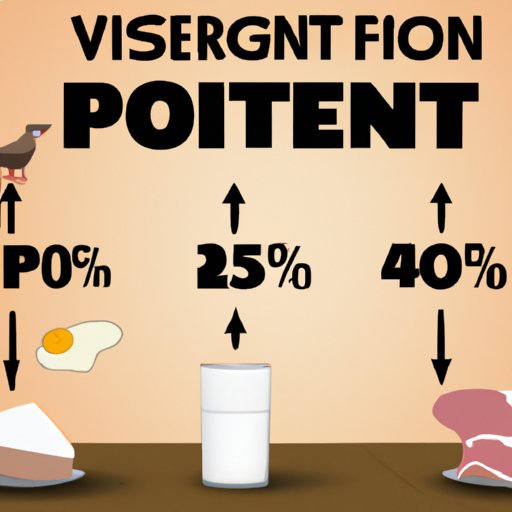
I. Introduction
Protein is an essential macronutrient that plays a critical role in building and repairing tissues, supporting immune function, and maintaining overall health. While it’s widely recognized as a necessary nutrient, many people remain unsure about just how much protein they need to consume each day. In this article, we’ll explore the ins and outs of protein consumption, including how much you need per day, how to determine the right amount for your body, and common misconceptions about high protein diets.
II. Why Protein is Essential: Determining the Ideal Grams Per Day
Protein is composed of amino acids, which are the building blocks of tissues, muscles, and organs throughout the body. Adequate protein intake is critical for maintaining and repairing these tissues, as well as supporting a healthy immune system.
The amount of protein an individual needs can vary based on factors such as age, weight, and activity level. The USDA recommends that adults consume at least 0.8 grams of protein per kilogram of bodyweight, but some studies suggest that higher intake may be necessary for athletes or those engaging in intense exercise.
III. Maximizing Your Daily Workout: The Science Behind Protein Consumption
Protein consumption is an important aspect of athletic performance and recovery. Consuming protein before and after exercise can help to increase muscle growth and enhance recovery time. This is because protein contains essential amino acids that help to trigger protein synthesis, the process of building new muscle tissue.
Some examples of protein-rich foods that are ideal for post-workout recovery include eggs, Greek yogurt, and lean meats such as chicken or turkey breast.
IV. Breaking Down Protein Requirements: How Much You Really Need Per Day
To determine your individual protein needs, it’s important to factor in your body weight, as well as your activity level. For most individuals, consumption of around 1 gram of protein per pound of body weight each day can help to support muscle growth and overall health.
However, it’s important to note that specific protein intake recommendations may differ based on the type of athlete. For example, endurance athletes may require slightly less protein than strength athletes due to different energy demands on the body.
V. Customizing Your Diet: Calculating the Right Protein Intake for Your Body
Calculating your ideal protein intake can be done through a process called macro counting. This involves tracking your daily macronutrient intake, including protein, carbohydrates, and fats, and adjusting it based on individual needs and fitness goals.
While it can be challenging to accurately calculate protein intake, apps such as MyFitnessPal can help to simplify the process and put you in control of your individual protein needs.

VI. High Protein Diet Explained: Sorting Fact from Fiction
High protein diets have become increasingly popular in recent years, thought by some to promote weight loss, muscle building, and improved body composition. However, there are many misconceptions associated with high protein diets, such as the idea that they can harm kidney function or lead to weight gain.
While there are potential drawbacks to a high protein diet, such as increased dietary restrictions and cost, studies have shown that it can be an effective tool for weight loss and body composition goals. It’s important to consult with a healthcare professional before making any significant dietary changes.
VII. Fueling Your Body Right: Protein Consumption for Optimal Health and Recovery
Protein consumption not only affects athletic performance and recovery but also plays a vital role in overall health and well-being. Consuming protein with each meal can help to support healthy weight management, reduce muscle soreness, and increase feelings of fullness and satiety.
Some examples of protein sources that are also rich in other essential nutrients include quinoa, lentils, and leafy greens such as spinach or kale.
VIII. The Debate Over Protein Requirements: Experts Weigh In on the Perfect Grams Per Day
The scientific community remains divided on the amount of protein individuals need to consume each day. While some experts recommend a moderate protein intake, others suggest that higher consumption may be necessary to promote overall health and athletic performance.
Ultimately, the ideal amount of protein for your body will depend on your individual needs, goals, and lifestyle factors. Consulting with a healthcare professional or registered dietitian can help you to determine the right protein intake for your body.
IX. Conclusion
In conclusion, protein is an essential nutrient required by the body for a range of critical functions. Understanding your individual protein requirements can help you to optimize athletic performance, support muscle growth and repair, and maintain overall health and well-being.
By factoring in your weight, activity level, and fitness goals, you can determine the ideal grams per day for your body. Whether you prefer plant-based or animal-based sources of protein, incorporating a variety of protein-rich foods into your diet can help to ensure optimal nutrition and health.





